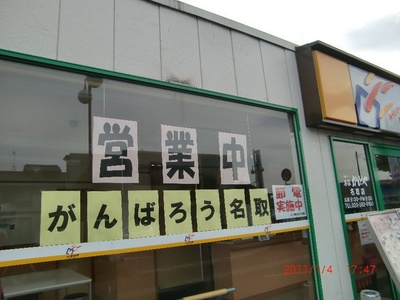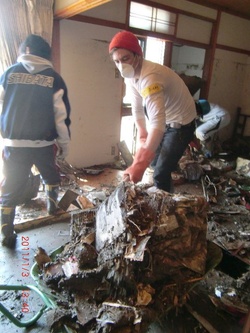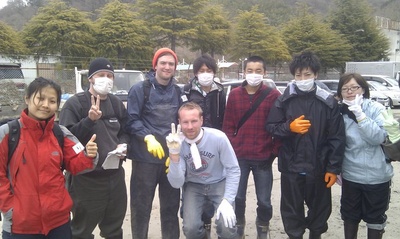Read Part 1 >>
Reaction from family back home
My family were also incredibly understanding and supportive for me throughout, saying that although they were worried, they would understand whatever decision I chose to make with regards to staying or going. They also very sensibly took my advice to ignore the dreadful sensationalist news reporting on the nuclear plant, sticking to the fact-based reporting that I directed them to, which calmed some of their worries. I’ll admit that it’s been very hard to keep a level head throughout the past few weeks, but in my view this was one of the most important things that everyone needed to do. There’s a mentality in my country which we refer to as “having a stiff upper lip” which basically means that you shouldn’t let your emotions get the better of you in stressful situations. There’s also a saying which seemed to fit very well, so whenever I got scared I just repeated it to myself: “Keep calm and carry on.”
These things were factors which in hindsight I can see made me want to stay, however the main reason for staying was far, far simpler.
“Sendai is my home.”
I may have been born somewhere else, but my life is here now and it’s a life I very much enjoy and have made many heartfelt connections with. My school and the city of Sendai have been very welcoming to me since my arrival. I’m quite often treated as an honoured guest by schools, although I don’t want to be, and have had many Japanese people I’ve met be incredibly kind to me. I’ve made many close friends and really love being here, so I feel it’s my duty to help the victims of this disaster so that I can give a little something back to this place that has given me so much. So the thought of abandoning everything I loved for the relative safety of somewhere else never really felt like an option to me. This whole disaster has really made me see how fragile life can be, but it has also showed me how people can overcome great difficulties through unity, compassion, perseverance, and togetherness. The scale of this disaster is almost bigger than I can really comprehend, but we really are all in this together, Japanese and foreign alike, and the only way we will overcome is if we remember that. For that reason, I never really felt like I could leave my new home.
The foreign community helps out
With regards to volunteering, the jobs I personally have been doing have been manual labour. At first I was going to places across Sendai to help people move whose houses had been badly damaged by the quake.
I have witnessed lesser property damage in the earthquake hit areas, right through to complete devastation in the worst hit tsunami areas such as Yuriage. Almost nothing is left there save mountains of debris and concrete foundations where row upon row of houses used to be. It’s a tragic sight to behold. (You can see the photos and videos below for more detail.)
Then after a week, when the roads in the areas hit by the tsunami had been cleared, we were able to go there to help with the clean up. I’ve been working with other foreign JET Programme participants and Japanese people from both Sendai and all over Japan on this. We’ve been going to places like Wakabayashi, Ishinomaki, and Natori to help with the cleanup efforts. We’ve worked on several farms and in people’s homes, shovelling countless wheelbarrows of mud out of buildings so that they can begin to properly clean up and start to get things back to the way they were. We’ve also had to help many people throw away almost everything they owned, basically anything that wasn’t high up enough to avoid the water, as it’s all been ruined.
It’s always tough work and it’s really sad to see so much devastation, but at the end of it, we get to see that something is a little better than before, even if it’s only one or two houses that each team can get to a day. For me, this has really helped to lift my spirits and has given me a reason to keep going.
I’ve also recently set up a team of around 30 of us foreign volunteers, including JET Programme participants and our friends. I know a great many people who want to help but aren’t always sure how due to the language barrier. Using connections I’ve made in the volunteer centres, we’re hoping to continue the same sort of work that I’ve been doing, plus anything else that we can do to help as new needs arise. We’re also working hard on fund raising in our respective countries so that we can directly give the money to good causes in the local area.
Making Donations
The Japanese Red Cross is a good place to donate to as they’re doing a great job of caring for the refugees in the local area. However if you donate to other Red Cross organizations such as the Canadian one, you can’t guarantee the money will be used here in Japan. The donations I am gathering though will go to the “Miyagi Victims Relief Fund,” which has been set up by the Sendai Board of Education. The money will be used to help victims to rebuild their lives.
Everyone has a long, hard job ahead of us, but if we all pull together and all keep trying, we will overcome. I’ve never experienced anything like this. It’s definitely changed me for the better. It’s made me see how fragile, but also how wonderful life is. I also truly understand the importance of strength, unity, and courage—things which before were somewhat abstract concepts.
They’ve been amazing. The strength, civility, generosity, humility, and kindness they’ve shown these past 4 weeks has left me weak-kneed with admiration. I’m proud to call this my home.
Any other comments? Anecdotes? Reflections?
Too many to mention. I think I’ve felt almost every emotion a person can feel! The earthquake last night reminded everyone of everything, so things feel a little too fresh again to start reflecting properly. Hopefully the tectonic plates will calm down now though as everyone really just wants to carry on down the long path to recovery now.
School starts again on Monday (April 11). We have a new group of ichinensei, all students from my shogakkos, so I’m really looking forward to having fun with them cos [because] they’re always really genki!
Here are links to some videos on YouTube that Chris has taken of the aftermath of the disaster:
© 2011 Norm Ibuki









